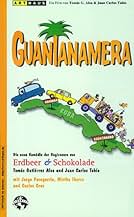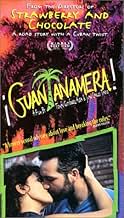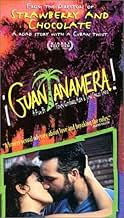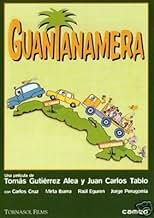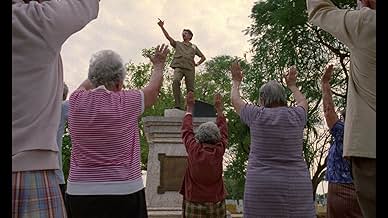IMDb RATING
6.9/10
1.6K
YOUR RATING
During a funeral procession in Cuba, mourners and truck drivers engage in deep conversations, revealing unexpected connections between their contrasting lives.During a funeral procession in Cuba, mourners and truck drivers engage in deep conversations, revealing unexpected connections between their contrasting lives.During a funeral procession in Cuba, mourners and truck drivers engage in deep conversations, revealing unexpected connections between their contrasting lives.
- Directors
- Writers
- Stars
- Awards
- 7 wins & 1 nomination total
Luisa Pérez-Nieto
- Marilis
- (as Louisa Pérez Nieto)
José Ángel Espinosa 'Ferrusquilla'
- Justo
- (as Jose Antonio Espinosa)
Rubén Breña
- Rivero
- (as Rubén Breñas)
- Directors
- Writers
- All cast & crew
- Production, box office & more at IMDbPro
Featured reviews
Guantanamera, a Cuban light drama by accomplished director Tomas Gutierrez Alea (1928-1996), is a tropical road movie. The setting is the 1990s, following withdrawal of USSR support for its little-brother Communist regime. A woman dies, some distance removed from Havana, and the goal is to transport her to the capital for burial. A tiny entourage of family accompanies the hearse.
Some snippets, though not central to the plot: How do government-run funeral homes work exactly, in a Communist country? Well, first, there is a per-person quota of refreshments for the bereaved and acquaintances who are paying last respects. But doesn't this attract inauthentic freeloaders? Second, there is a scene involving a meeting of regional mortuary-manager bureaucrats. If travel expenses for hearse trips are allocated according to the relative mileage of the territories through which vehicles traipse, the funeral home functionary in a crossroads region takes more than her share of budgetary hits. Is that fair? Third, there is the question of why the burial in Havana in the first place. If everybody and everywhere in Cuba are socialistically equal, what's wrong with the deceased staying put where she was? Meanwhile, we also have organized hitchhiking. Officials have the power to commandeer vacant seats from those who have for those who need.
There is some Latino romance, and some lightly subversive free enterprise. All in all, a likable movie. Mirta Ibarra, who starred twelve years earlier in Alea's 1983 film, Up To a Certain Point, gets an encore. She plays the niece of the deceased, who is also the wife of the over-serious Daniel Ortega-looking official who's in charge of the expedition.
Some snippets, though not central to the plot: How do government-run funeral homes work exactly, in a Communist country? Well, first, there is a per-person quota of refreshments for the bereaved and acquaintances who are paying last respects. But doesn't this attract inauthentic freeloaders? Second, there is a scene involving a meeting of regional mortuary-manager bureaucrats. If travel expenses for hearse trips are allocated according to the relative mileage of the territories through which vehicles traipse, the funeral home functionary in a crossroads region takes more than her share of budgetary hits. Is that fair? Third, there is the question of why the burial in Havana in the first place. If everybody and everywhere in Cuba are socialistically equal, what's wrong with the deceased staying put where she was? Meanwhile, we also have organized hitchhiking. Officials have the power to commandeer vacant seats from those who have for those who need.
There is some Latino romance, and some lightly subversive free enterprise. All in all, a likable movie. Mirta Ibarra, who starred twelve years earlier in Alea's 1983 film, Up To a Certain Point, gets an encore. She plays the niece of the deceased, who is also the wife of the over-serious Daniel Ortega-looking official who's in charge of the expedition.
Hearing the word Guantanamera, a word surge raced through my mind; Cuba, Guantanamo prison, Guatemala, or one of the most common Latin American songs? What could it be? I wondered. It is not much of the above but a sound track to a road movie Guantanamera, a death and love story.
In matters pertaining to birth, death and burial, people may not choose the place of birth or death, but they chose where they want to be buried. And this becomes a central issue in this road movie. It portrays the core values of a typical traditionalist Cuban family in a socialist country. It is for this reason that a dead body gets flown either out of state or country for burial. A song (Guantanamera), well spiced and crafted to fit each and every moment and character plays throughout the movie. This movie exposes the economics of a socialist run country. Road side vendors price their items in dollars. This suggests the instability of the national currency (possibly inflation).
When Gina puts on a new dress and let her hair run loose, it symbolizes self discovery and a sense of freedom. For the first time in this movie, she stands up to her husband and tells him that the days of subordination are over, she would not take off her dress. But also this could or symbolize people who live under a communist run regime, that there is limited freedom of choices. Those who are fed up of the system migrate, or export themselves to America through illegal means.
The directors did a great job in telling the general public about the flaws of a communist run country; corruption, dilapidating buildings and failed economy. Also the directors employed an excellent editing technique MONTAGE. Gina paces up and down and finally walks away from the funeral and finds comfort and love in Mariano. Both Gina and Mariano ecstatically share a smile and laughter whilst the funeral is still in procession. The MONTAGE suggests the anguish of people in Cuba go through in deserting their beloved country in search of freedom and better life.
In matters pertaining to birth, death and burial, people may not choose the place of birth or death, but they chose where they want to be buried. And this becomes a central issue in this road movie. It portrays the core values of a typical traditionalist Cuban family in a socialist country. It is for this reason that a dead body gets flown either out of state or country for burial. A song (Guantanamera), well spiced and crafted to fit each and every moment and character plays throughout the movie. This movie exposes the economics of a socialist run country. Road side vendors price their items in dollars. This suggests the instability of the national currency (possibly inflation).
When Gina puts on a new dress and let her hair run loose, it symbolizes self discovery and a sense of freedom. For the first time in this movie, she stands up to her husband and tells him that the days of subordination are over, she would not take off her dress. But also this could or symbolize people who live under a communist run regime, that there is limited freedom of choices. Those who are fed up of the system migrate, or export themselves to America through illegal means.
The directors did a great job in telling the general public about the flaws of a communist run country; corruption, dilapidating buildings and failed economy. Also the directors employed an excellent editing technique MONTAGE. Gina paces up and down and finally walks away from the funeral and finds comfort and love in Mariano. Both Gina and Mariano ecstatically share a smile and laughter whilst the funeral is still in procession. The MONTAGE suggests the anguish of people in Cuba go through in deserting their beloved country in search of freedom and better life.
Guantanamera is a movie that encompasses the genre of a road movie and love story. Gina's Aunt Yoyita from Havana, who was once a famous performer, is in Guantanamera to receive an award. During the award ceremony, she notices her long lost love from 50 years ago, Candido. The relationship rekindles and the two are in love once again. When Yoyita suddenly dies, her body needs to be transported back to Havana. Gina's husband Adolfo, who is an undertaker for the state, takes charge of everything and arranges Yoyita's long complicated journey home. Adolfo is an arrogant abuser who has no respect for his wife. At one point he visualizes himself on top of a statue, as the leader. Accompanied by a driver, Adolfo, Gina, and Candido make the long complicated journey to Havana transporting Yoyita from vehicle to vehicle implementing Adolfo's new money saving plan. During the journey, Gina encounters one of her prior students, a womanizing trucker named Mariano, who has longed for Gina since she was his teacher. The two find themselves running into each other at different points along the way. Is Adolfo worthy of Gina's love, or does Mariano finally win his long lost teacher? The director makes it a point for the camera to show us the lush tropical background of Cuba, as well as the poor, dirty, poverty stricken areas displaying billboards with political messages indicating corruption. During the journey, Mariano and Ramon are seen picking up hitchhikers delivering them, as well as, the product on the bed of the truck. The roads are unpaved and dirty showing the economic hardship of the region. Favors are done in exchange for monetary reward, evidence of economic corruption. The film techniques used are similar to those used in Hollywood. They include the use of brightly lit scenes, with most being filmed outside, using natural daylight. The cinematography was mostly at eye level with a motion picture camera,showing steady, smooth scenes. The film was slow paced but kept my attention.
If you care about the evolution of thinking regarding social organization, you will necessarily have to go through the biggest fracture in the post-ww2 world. the iron curtain. it's up to you making your own opinion regarding what each side had to offer, and which sides on each side you support. To help you make up your mind you have to rely on the stories told by those who lived in the flesh the problems and advantages of those worlds. I mean the honest thinkers, or people with honest stories to tell. If you deepen your research on the soviet branch of the curtain, you will necessarily face the cuban case. It's a fascinating story. And within that story, there are a few honest storytellers. Korda, and Gutierrez-Alea are the most meaningful, they work with images. But while Korda is fundamentally important because he followed the process, the revolution, Gutierrez is someone who was at the beginning, and kept telling his honest version of the reality until his death. Just before that, he made this beautiful film.
So, we know we will watch in his films the narrative of someone who never ceased to make questions, and denounce what he believed was bad, as much as he had denounced the pre-Castro abuses, and as much as he had genuinely embraced the revolution. This is his vision, in the mid 90'. Disenchanted, cynic, ironic. Few times has the road-trip been so metaphorical, so invested with the notion of journey, through time(s), hardly through physical space. Also you can invest any symbolic weight to the corpse they transport. But what i care about is the pure talent Alea had as a true cinematic storyteller. My bet is that he started with images, loose disconnected images that he wanted to pass. Just like the final shot in this film. Than he worked hard on building a narrative structure than could competently, coherently and, y say, poetically, integrate all his multiple visions. The fun thing about his film is that the multiplicity of visions from the same beautiful mind is reflected in the various story lines we follow, each with its own tone, and mode. We have the soap opera story that surrounds the funny life of Mariano, multiple women that mean sex, to him, and one platonic love, reluctant to be consumed. We have the cynic critic to the regime totally invested in the stupidity of the whole funeral service business. That business about inventing rules to spare fuel; all that represented by the frigid bureaucratic husband, a sad portrait to a by now (and than) sad system. Than the heaviest drama falls upon the most delicate soul in the living characters, the old widow, husband to a late artist, the one who never ceases to care about people, eventually the one true love in the story (i'm not sure to consider the teacher a woman in love). Alea doesn't spare on the cynic posture, so the black humour with the corpse, near the end, really grows an uneasy feel on you. All these lines are perfectly integrated by a well managed road trip, and a good adaptation of an eternal song, which incidentally is an avatar for the cuban soul.
This is like an Italian post-modern "sweet" film, but better, because it is more meaningful.
My opinion: 4/5
http://www.7eyes.wordpress.com
So, we know we will watch in his films the narrative of someone who never ceased to make questions, and denounce what he believed was bad, as much as he had denounced the pre-Castro abuses, and as much as he had genuinely embraced the revolution. This is his vision, in the mid 90'. Disenchanted, cynic, ironic. Few times has the road-trip been so metaphorical, so invested with the notion of journey, through time(s), hardly through physical space. Also you can invest any symbolic weight to the corpse they transport. But what i care about is the pure talent Alea had as a true cinematic storyteller. My bet is that he started with images, loose disconnected images that he wanted to pass. Just like the final shot in this film. Than he worked hard on building a narrative structure than could competently, coherently and, y say, poetically, integrate all his multiple visions. The fun thing about his film is that the multiplicity of visions from the same beautiful mind is reflected in the various story lines we follow, each with its own tone, and mode. We have the soap opera story that surrounds the funny life of Mariano, multiple women that mean sex, to him, and one platonic love, reluctant to be consumed. We have the cynic critic to the regime totally invested in the stupidity of the whole funeral service business. That business about inventing rules to spare fuel; all that represented by the frigid bureaucratic husband, a sad portrait to a by now (and than) sad system. Than the heaviest drama falls upon the most delicate soul in the living characters, the old widow, husband to a late artist, the one who never ceases to care about people, eventually the one true love in the story (i'm not sure to consider the teacher a woman in love). Alea doesn't spare on the cynic posture, so the black humour with the corpse, near the end, really grows an uneasy feel on you. All these lines are perfectly integrated by a well managed road trip, and a good adaptation of an eternal song, which incidentally is an avatar for the cuban soul.
This is like an Italian post-modern "sweet" film, but better, because it is more meaningful.
My opinion: 4/5
http://www.7eyes.wordpress.com
The movie seems ambitious in its elements - a satire of bureaucratic Cuba (via the red tape associated with cross-country funeral delivery arrangements), frequent broad comedy (mainly in the truck driver's entanglements with his various women), much romantic wistfulness as the old man deals with a life largely wasted through lack of courage and Gina realizes the aridity of her marriage to Alonzo, within which her own creativity is stifled; the economic and cultural diversity of Cuba sketched in bits and pieces along the way. As executed, the overall framework for all of this - that of a loosely structured road movie - sets the tone more fully than might have been advisable: the rhythm reflects the leisurely procession along the road and the jauntily resigned renditions of the title song, which makes for good but not very provocative entertainment. The film seems to look back more than forward, with a pervasive sense of quiet nostalgia and regret about it, although there's also a gentle postivism that things can be overcome (with no thanks to the political infrastructure, it subtly suggests).
Did you know
- TriviaFinal film directed by Tomás Gutiérrez Alea.
- ConnectionsReferenced in Last Night (1998)
- How long is Guantanamera?Powered by Alexa
Details
Box office
- Gross US & Canada
- $903,840
- Opening weekend US & Canada
- $8,851
- Jul 6, 1997
- Gross worldwide
- $903,840
Contribute to this page
Suggest an edit or add missing content

